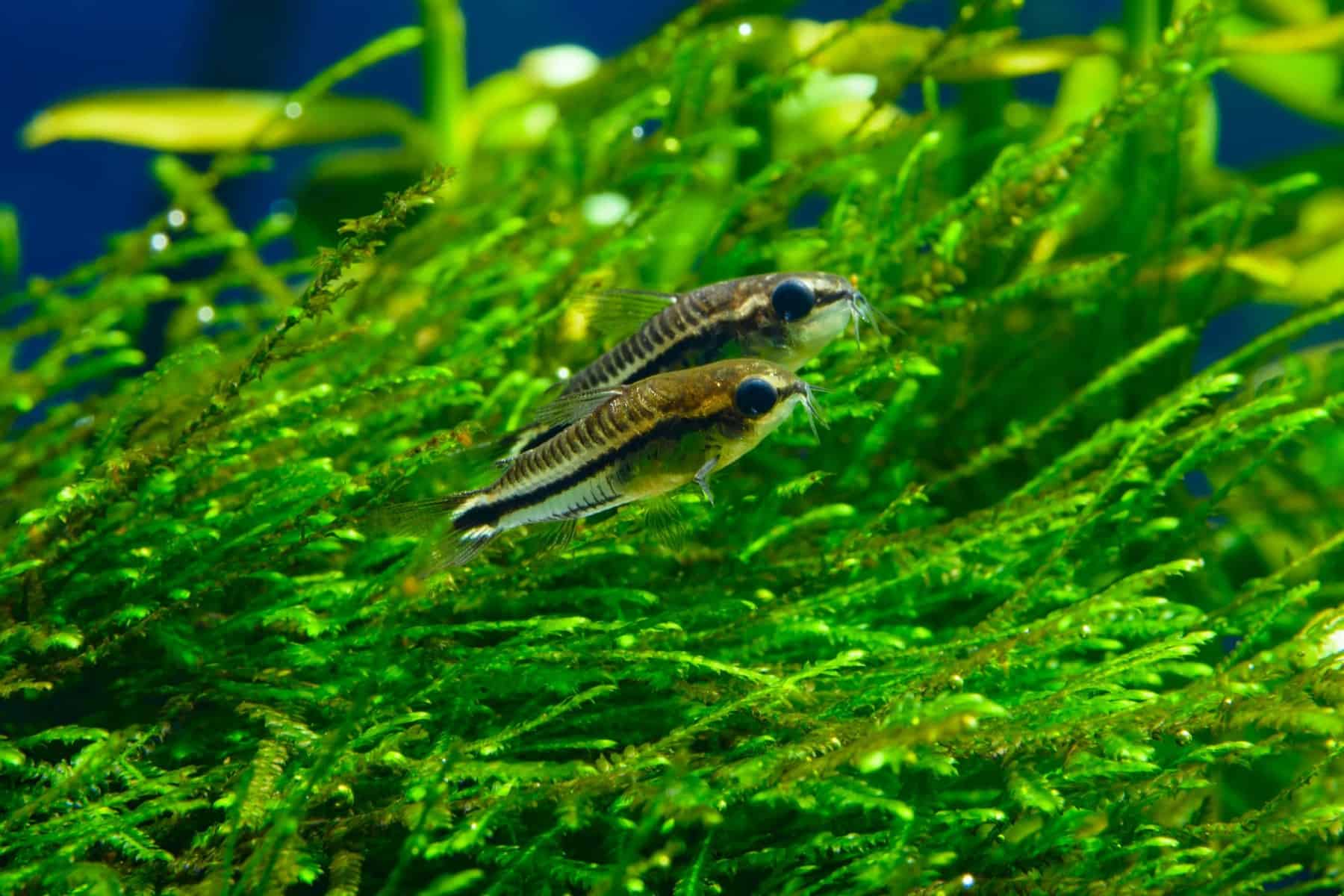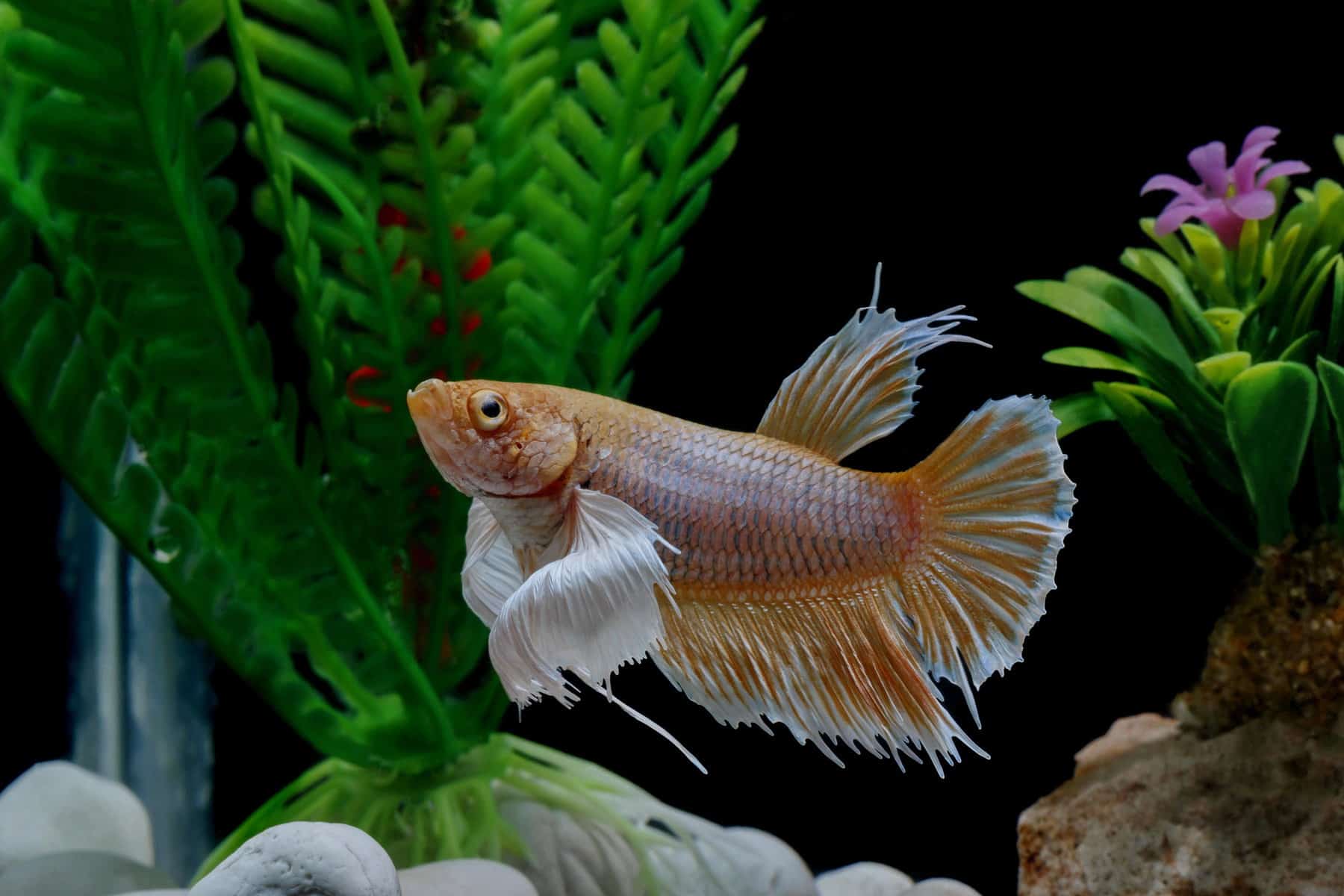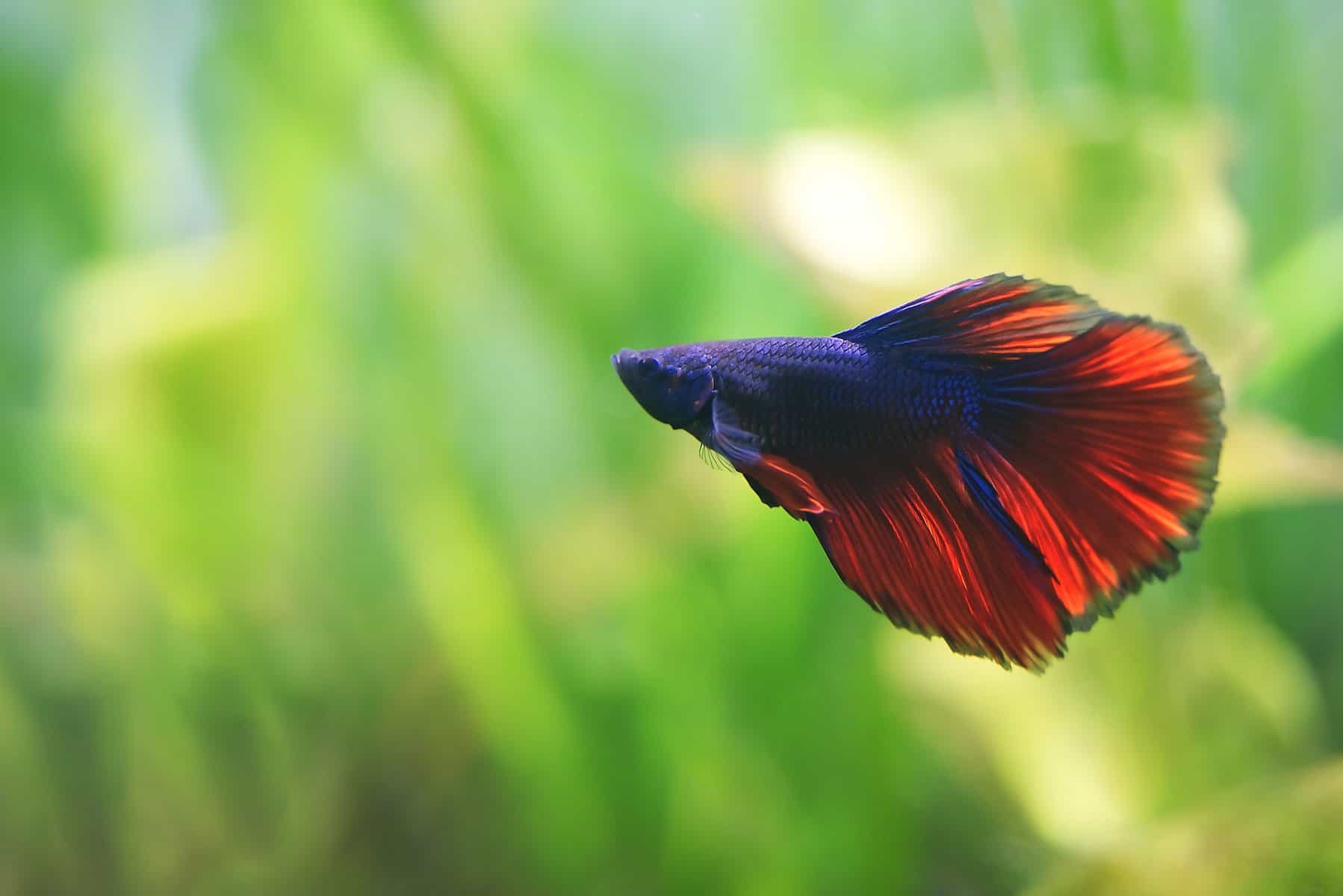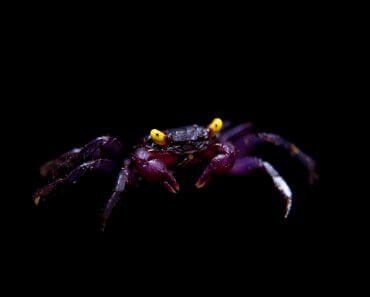So you’re wondering if pygmy corydoras could make the perfect tank mates for betta fish?
Pygmy cory catfish are indeed one of the best tank mates for betta fish, but that doesn’t mean it’ll always be a match made in heaven!
The aggressive betta fish can be notoriously difficult to keep with other fish, so even with the best companions there’s still a small chance of trouble.
Let’s have a closer look at keeping pygmy corydoras with betta together, and find out how to increase the chances of making it a harmonious and peaceful pairing.
Firstly, What Is a Pygmy Cory?

The Pygmy Corydoras catfish (Corydoras pygmaeus) is one of the smallest members of the cory catfish clan. Famously easy to keep, cories are well-known for being good-natured and their feeding habits can also help to keep your tank clean!
But whereas most cories are bottom-dwellers, Pygmy cories are unusual in that they prefer to swim in the middle layers of the aquarium.
At only about an inch long, they are popular for aquarists with smaller fish tanks, but it should be noted that these shoaling fish strongly prefer to be kept in groups of 8 or more.
Originally from the Amazon basin, Pygmy corydoras fish enjoy relatively soft, acidic water.
Pygmy Cory Care Sheet
| Pygmy Corydoras Info | |
|---|---|
| Scientific Name | Corydoras pygmaeus |
| Native Habitat | Rio Madeira, Brazil |
| Maximum Size | Up to 1.2” |
| Temperature | 72-79°F |
| Water Parameters | pH: 6.0-7.2, dGH 4-16 |
| Temperament | Very peaceful |
| Lighting | Dim-medium |
| Sexual Dimorphism | Females grow slightly larger and wider. |
| Feeding | Omnivorous: Catfish pellets, granules, flake, live and frozen foods |
| Minimum Tank Size | 10-gallons |
| Care Level | Beginner |
The Infamous Betta Fish

Betta fish need little introduction. Their huge flowing fins and exotic colors have made them one of the most popular aquarium fish in the world.
Hailing from Southeast Asia, their aggressive nature has also earned them the names ‘Siamese Fighting Fish’ or ‘Japanese Fighting Fish’.
Although bettas only grow to 2-3 inches long, their aggressive temperament and fragile fins make them quite difficult to find good tank mates for.
Betta Fish Care Sheet
| Betta Fish Info | |
|---|---|
| Scientific Name | Betta splendens |
| Native Habitat | Thailand, Cambodia |
| Maximum Size | 2-3” |
| Temperature | 78-81°F |
| Water Parameters | pH: 6.0-7.0, dGH 4-20 |
| Temperament | Aggressive |
| Lighting | Dim-medium |
| Sexual Dimorphism | Males larger with longer fins |
| Feeding | Mainly carnivorous: Betta pellets, live & frozen foods. |
| Minimum Tank Size | 5-gallons |
| Care Level | Beginner – Intermediate |
Why Betta Fish and Pygmy Cories Make Good Tank Mates?
Water Parameters
When choosing fish to cohabit in the same aquarium, we need to ensure they enjoy similar water conditions. Luckily, betta fish and pygmy cories are very well matched in their water preferences.
Although they’re from opposite sides of the world, both species will enjoy soft water with a pH of between 6-7 and a GH of between 5-16.
They’re also compatible when it comes to water temperature, with betta fish preferring water between 78-81°F, and Pygmy cories enjoying temperatures between 71-79°F.
Setting your aquarium heater thermostat to 78-79°F should keep both species happy.
Tank Setup
Betta fish love densely planted aquariums, perhaps with some pieces of driftwood, and some rocky caves. Pygmy cories enjoy a very similar habitat, making it easy to keep these two species happy together.
Another plus point is that both of these fish enjoy slightly subdued lighting, and this can be achieved by using aquarium bulbs that are not too bright, as well as incorporating floating plants such as Amazon Frogbit or Water Lettuce to create dappled shade.
Other plants in the tank could include the Amazon sword, Java fern, and Java moss. Cory catfish are especially fond of resting on sturdy, broad plant leafed plants such as Anubias.
Feeding
When it comes to food, these two fish species are fairly well-matched once again. Both enjoy a variety of foods, including commercial dried foods, as well as live and frozen foods like bloodworms, mosquito larvae, daphnia, brine shrimp, etc.
The only significant difference in their feeding habits is that bettas prefer feeding from the water’s surface, while pygmy cories are mid-water feeders and will wait for food to sink before consuming it.
This means that if you’re using floating betta pellets, your cories are unlikely to get a chance to eat them.
To overcome this, you could first feed your betta some specialized floating betta food in one corner of the tank, and while he’s feeding, throw in some sinking catfish pellets on the other side. This way both fish should get their food without confusion or quarrels.
With live and frozen foods, both species should have plenty enough chances to chow down on whatever you feed them.
If you’re one of the betta keepers who prefer to give your fish a day of fasting once a week, this shouldn’t be a problem for your cory either.
Cory catfish are famous for their foraging habits and, when hungry, will scour the tank looking for bits of algae or edible morsels to eat. They might even help to keep your tank clean!
Coloration
Male betta fish love to fight with each other, and seem to have it hard-wired into their DNA to attack any other colorful fish, especially those with long fins too.
This means that companion fish like guppies and platies can easily fall victim to their menacing territorial instincts.
But plain-colored fish with short fins like pygmy cories are less prone to get attacked because they don’t resemble a betta fish in any way and so aren’t typically perceived as competition.
That’s not to say that aggression is an impossibility, but it’s less likely.
Temperament
When it comes to temperament, there are some pros and cons of keeping these fish together – let’s start with the positives!
Pygmy cories are among the most friendly fish you could wish to keep, and unlike many other types of fish, will never harass your betta or nip his fins.
Betta fish, on the other hand, are infamously aggressive fish and have been known to attack pygmy cories. More on that in the next section…
Potential Problems With Keeping Betta Fish and Pygmy Cories Together
Aggression
So, while the tiny pygmy cories pose no threat whatsoever to your betta fish, that won’t necessarily prevent your betta from chasing and harassing them!
Because pygmy cories are so small and occupy some of the same swimming space as your betta, they can make easy targets for a betta that’s seeking an outlet for his aggression.
This really depends on the temperament of your individual betta fish. While some bettas are relatively peaceful fish that can get along with a variety of tank mates, others are notoriously territorial and won’t accept anyone else in their tank.
Some male bettas will even attack snails!
Looking through fishkeeping forums, most people who’ve kept pygmy cories and bettas together have had very positive experiences, with no aggression between the two species.
There have, however, been a few cases where bettas have attacked or even killed cory catfish. As always with choosing tankmates for betta fish, there can be no guarantees!
You can try to suss out the temperament of your betta by seeing how he responds to his own reflection or other robust tank mates such as nerite snails. If he seems especially fierce, it may be wise not to add any other fish to his tank.
Tank Size
Pygmy cories are one of the smallest tank mates that you can find for your betta, but that doesn’t mean you can keep them in a tiny tank.
While betta fish can be kept in 5-gallon nano tanks, pygmy cories require at least 8-10 gallons because they are schooling fish and need to be kept in groups of at least 8.
In a smaller tank, there wouldn’t be enough room to keep a sufficient number of cories. In smaller groups, pygmy cories would feel less secure and may become more vulnerable to attack from your betta.
This means that a 10-gallon tank is the bare minimum that you could keep a betta fish and pygmy cories in together.
Swimming Space
When choosing tank mates for bettas, some fish keepers prefer to choose species that inhabit a different layer of the water from the betta fish.
Since bettas are mid-surface level fish, choosing other fish that prefer to swim near the bottom of the tank helps to avoid territorial conflicts.
As pygmy cories are mid-level swimmers, they’ll spend more time swimming in the same space as your betta, thus slightly increasing the chance of conflicts.
How To Keep Bettas and Cory Catfish Together Peacefully

Mixing other fish with male bettas will always have its risks. But you can minimize the chances of problems by the way you set up your tank.
Add Lots of Hiding Places
One of the keys to creating a peaceful tank environment for your fish is to include plenty of hiding places where fish can take refuge or avoid one another when they’re feeling vulnerable to attack.
Rocks, plants, and driftwood also help to create boundaries where your fish can define their own territories or safe places, helping a harmonious habitat to become established in the tank.
Get a Larger Tank
Since conflicts often arise due to territorial disputes and a lack of space, one of the best steps for creating a peaceful tank is to get a larger tank with a sparser stocking density.
As I mentioned, the minimum tank size for bettas and pygmy cories is 10 gallons, but you could offer the same fish more swimming space by offering them a 15- or 20-gallon tank too.
Alternatives Tank Mates for Betta Fish
If you’ve read through this guide and feel that pygmy cories might not be the right tank mates for your betta, then don’t worry – there are plenty of other species that could fit the bill!
Invertebrate Tank Mates for Nano Tanks
We’ve already established that anything less than a 10-gallon tank is too small to keep bettas and pygmy cories together. But there are some other species that can be kept with betta fish, even in a 5-gallon aquarium.
But better than choosing other fish as tank mates for your betta fish in nano aquariums is to choose invertebrates. Snails and shrimp make excellent choices for 5-gallon tanks, and will eat algae to help keep your tank clean!
As long as your water is well-oxygenated, Ghost shrimps, Cherry shrimps, and Amano shrimps make ideal companions for all but the most-aggressive bettas!
As for mollusks, nerite snails are the ultimate choice for nano tanks since they don’t breed in captivity, so will never overcrowd your tank.
Bottom Dwelling Cory Catfish
While pygmy cories inhabit the mid layers of your aquarium and come into frequent contact with your betta, other cory species are bottom dwellers, making conflicts less likely.
The smallest of these is the ‘salt and pepper cory’ (Corydoras habrosus), a very cute variety of cory that will also do wonders at keeping the bottom of your aquarium clean!
Larger types of cory for betta aquariums include the panda cory, leopard cory, bandit cory, and bronze cory.
You can enjoy reading our detailed guide to some of the most popular cory catfish species here.
Conclusion
Pygmy cory catfish are one of the most popular tank mates for betta fish for several reasons. Their extremely docile nature means that they will never pose a threat to your betta, and, as a hardy and fascinating fish, they’re also eminently suitable for beginners.
That being said, there are no guarantees when it comes to keeping tank mates with bettas, and there’s a small chance that your betta fish might still choose to attack your pygmy cories without provocation.
To find out more about the dos and don’ts of finding compatible tank mates for your betta, check out our dedicated page here.


























